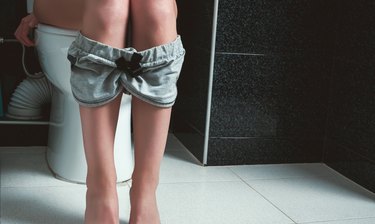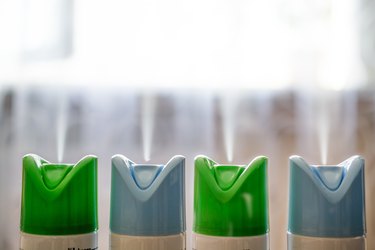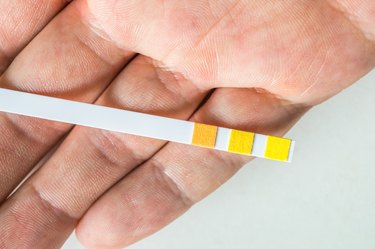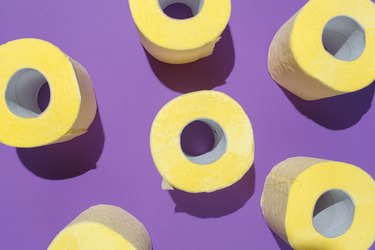
Your pee can tell you a lot about your health. In fact, how often you go is one indicator of your overall wellbeing. Not peeing enough or tinkling too many times can signal that something's not quite right with your plumbing.
While there's no precise number of times you should pee in a 24-hour period — your own frequency can vary day to day — Kara Watts, MD, assistant professor of urology at Montefiore Medical Center in the Bronx, says the average adult should urinate around seven times a day.
Video of the Day
Video of the Day
This isn't necessarily a goal number, though. "A lot is dependent on how much you drink and how physically active you are," Dr. Watts says.
4 Things That Can Affect How Often You Pee
1. How Much You Drink
For one, the amount of fluid you take in will determine how much fluid comes out. If someone drinks three liters of water a day, for example, they'll likely spend more time peeing than someone who drinks much less. In this case, they don't need to be concerned about any underlying conditions, like an overactive bladder, Dr. Watts says.
In that same vein, if you're not urinating very often, this may be a sign that you need to hydrate more.
"The body's pretty smart on its own," Dr. Watts says. "It has its own [sensors and receptors] that stimulate thirst in the body if you're not getting enough fluid to maintain normal status."
Beyond thirst, another sign you're not hydrating enough is dark yellow urine. Light yellow to clear urine is a good sign you're hydrating appropriately, Dr. Watts says.
While drinking more fluids is generally advised for hydration, Dr. Watts says caring for some medical conditions, like heart failure or poor kidney function, may require people to limit their fluid intake. This is something you should discuss with your doctor, she says.
Tip
The Academy of Nutrition and Dietetics recommends aiming for 11.5 to 15.5 cups of water a day.
2. Certain Foods and Beverages
Your diet can also affect how often you go. Coffee, tea, alcohol and soda can all increase urine production, per the Mayo Clinic. Spicy foods, acidic fruits and chocolate can also lead to frequent peeing.
If you find your urination frequency is becoming disruptive or you're waking up in the middle of the night to use the bathroom, you may want to cut back on these foods and drinks, especially later on in the day.
Related Reading
3. Your Exercise Habits
Physical activity may affect how often you need to pee, but research on this subject is pretty sparse. Some women who exercise see increased rates of stress incontinence, according to a September 2019 review in Current Bladder Dysfunction Reports. "Physical activity appears to play a role in the development of stress urinary incontinence in active females of all ages," write the study authors.
Stress incontinence, which sometimes leads to "leaking," occurs when a physical movement, including laughing, coughing, sneezing or exercise, puts pressure on the bladder, per the Mayo Clinic. Stress incontinence happens when the muscles and tissues that support the pelvic floor muscles and the urinary sphincter weaken. These muscles may weaken over time with age, but can also lose strength due to childbirth or prostate surgery, per the Mayo Clinic.
On a separate note, exercise could potentially decrease the need to pee for some people. One March 2015 study in Medicine & Science in Sports & Exercise found that men who exercised less were at a greater risk for nocturia — the word for waking up in the middle of the night to pee. The authors of this study hypothesize that increased physical activity may help reduce nocturia, though more research is needed.
4. Medical and Other Health Conditions
There are some medical conditions associated with an overactive bladder (a general term used to describe frequent urination), says Dr. Watts:
- Diabetes
- Obesity
- Benign prostatic hyperplasia (BPH) — a noncancerous increase in the size of the prostate gland
- Urinary tract infection (UTI)
People who have given birth may urinate more frequently, Dr. Watts says, in part because the bladder muscles are weakened. During pregnancy, the bladder can become temporarily squished by the growing baby, per the Cleveland Clinic. Certain pregnancy hormones can also cause urges to urinate, and post-pregnancy, bladder control problems are fairly common.
Smokers are also prone to more frequent urination: Smoking irritates the bladder, per the American Urological Association, and carcinogens are expelled through the urinary tract, according to the Cleveland Clinic. (On a related note, smokers are three times as likely as nonsmokers to get bladder cancer.)
Stress and anxiety can also contribute to temporary or longer-standing bladder symptoms. "This is not necessarily a problem with the bladder, but a consequence of [stress]," Dr. Watts says. Often, treating the psychological or emotional conditions will help relieve the associated pee issues.
Certain medications may also affect the frequency with which you urinate. Any type of diuretic — a medication sometimes prescribed to people managing heart problems, high blood pressure or kidney function — can lead to frequent urination.
Related Reading
Think You're Going Too Often?
Many factors may cause you to pee more or less often, and there's a pretty wide range when it comes to a normal amount of peeing each day. But if your daily life is being disrupted by trips to the bathroom and you've ruled out the causes above, it's a good idea to check in with your doctor. Having a constant urge to pee can be a symptom of other conditions, including urinary tract infections, overactive bladders and diabetes.
- Mayo Clinic: "Bladder control: Lifestyle strategies ease problems"
- Medicine & Science in Sports & Exercise: "Physical Activity and Benign Prostatic Hyperplasia-Related Outcomes and Nocturia"
- Academy of Nutrition and Dietetics: "How Much Water Do You Need"
- Cleveland Clinic: "Urination: Frequent Urination: Possible Causes"
- Cleveland Clinic: "‘Surprising Link’: Smoking and Bladder Cancer"
- Urology Care Foundation: "7 Urologic Conditions Impacted by Smoking"
- Cleveland Clinic: "Pregnancy and Bladder Control"
- Current Bladder Dysfunction Reports: Physical Activity and Stress Incontinence in Women
- Mayo Clinic: "Stress incontinence"
Is this an emergency? If you are experiencing serious medical symptoms, please see the National Library of Medicine’s list of signs you need emergency medical attention or call 911.


